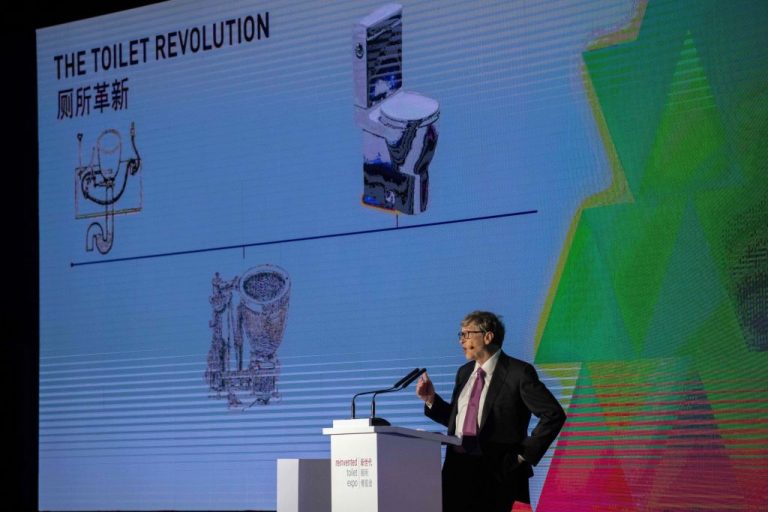The world’s third-richest man, Bill Gates, gave an exclusive interview with Chinese Communist Party (CCP) propaganda mouthpiece Xinhua on Feb. 15, where the Microsoft co-founder praised the People’s Republic of China and its leader Xi Jinping for their proclaimed goal to reach peak carbon dioxide emissions by 2030 and carbon neutrality by 2060.
“It’s great that President Xi is making climate a priority and wants to work with other countries on this…Without the contributions of China, many of the key ingredients (in fighting climate change) like the batteries and solar power wouldn’t be so affordable,” said Gates.
Gates also gave the CCP’s Belt and Road Initiative (BRI), his blessing so long as the BRI could use renewables in its energy consumption: “I hope that innovators in China can bring down the cost of green energy enough, so that China can even increase its commitment to use renewable energy in the Belt and Road Initiative.”

The BRI has been criticized as a debt-trap colonialism for many developing countries, as the Initiative often finances its projects through CCP banks, use Chinese workers and use Chinese materials in their construction. In the now-troubled Myanmar, deposed National League for Democracy leader Aung San Suu Kyi signed 33 BRI deals with the Party in 2020, giving the communist regime a railroad from the Myanmar-China border to the Bay of Bengal, building a deep sea port for the Party’s use, and a “New Yangon” industrial district in the country’s largest city, Yangon, which will be built by state-owned China Communications Construction Company.
Gates repeats Party’s ‘win-win’ rhetoric
Gates, an author for the World Economic Forum (WEF), also repeated the “win-win” rhetoric of the CCP when he told Xinhua “climate change and innovation are areas that China and the United States could achieve big win-win results.”
Success
You are now signed up for our newsletter
Success
Check your email to complete sign up
In 2018, Human Rights Watch challenged Beijing in an article titled “China’s ‘Win-Win’ Resolution Is Anything But” after the world’s largest emitter of greenhouse gasses introduced a resolution “Promoting the International Human Rights Cause through Win-Win Cooperation,” which was later changed to “Promoting Mutually Beneficial Cooperation in the Field of Human Rights.” HWR said that “China’s resolution is a win only for itself, and, if adopted, a serious loss for any country serious about human rights inside China and around the world.”
Similarly in 2019 at the “Summer Davos” WEF event New Champions 2019 held in Dalian, China, keynote speaker, PRC Premier Li Keqiang connected the BRI to the globalist movement when he said “The Belt and Road Initiative proposed by China aims to promote inclusive development by encouraging the integration of more countries and regions into economic globalization… We welcome the active participation of all parties in order to achieve interconnected and win-win development through mutually beneficial cooperation.”
Gates, who is now the number one owner of U.S. farmland and the largest shareholder of Canadian National Railway (CNR), has joined a number of western elites who have openly cozied up to the CCP since Joe Biden was inaugurated as U.S. President on Jan. 20.
‘Different norms in each country’
Speaking at a Feb. 16 town hall hosted by CNN, Biden appeared to defend Xi Jinping and the CCP’s authoritarian “social stability” rhetoric:
“If you know anything about Chinese history, the time when China has been victimized by the outer world is when they haven’t been unified at home,” said President Biden. “The central principle of Xi Jinping is that there must be a united, tightly controlled China. And he uses his rationale for the things he does based on that.”
Biden went on to imply that, while as U.S. president he was obligated to speak out about “what [Xi]’s doing in Hong Kong, what he’s doing with the Uyghurs in the western mountains of China and Taiwan trying to end the one China policy by making it forceful … culturally there are different norms in each country that their leaders are expected to follow.”
Earlier in the month, Chairman of the Republican Study Committee, Rep. Jim Banks (R-IN) released a six-page report outlining his Party’s concerns about the exceedingly soft stance the Biden administration has taken towards the CCP since taking power, including curious actions like suspending Donald Trump’s May 1, 2020 executive order prohibiting foreign adversaries such as China from ownership in the U.S. power grid. Biden wedged this suspension near the end of his day 1 executive order revoking the permit of the Keystone XL pipeline.
Follow us on Twitter or subscribe to our email list














